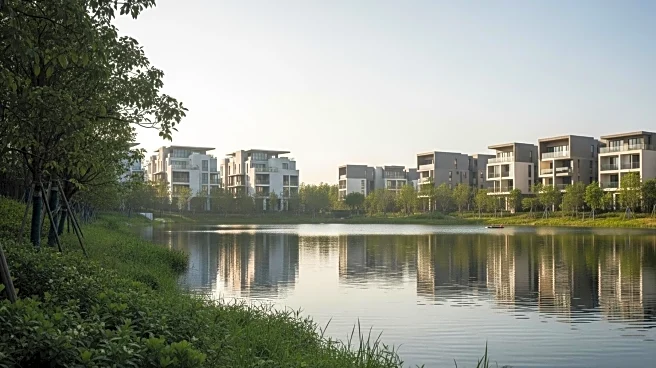What's Happening?
The redevelopment of Lakeside Apartments in Worcester is progressing, with plans approved for the third phase of the project. This phase involves the demolition of 11 buildings and the construction of a four-story building with 104 affordable housing units. The redevelopment is led by Tremont Development Partners and E3 Development LLC, aiming to revitalize the 76-year-old public housing complex originally built for military veterans. The new units will cater to households earning up to 60% of the area's median income, featuring amenities such as a fitness center and community areas. The project is part of a larger effort by the Worcester Housing Authority to provide affordable housing and improve living conditions in the area.
Why It's Important?
The redevelopment of Lakeside Apartments addresses the critical need for affordable housing in Worcester, offering new opportunities for low-income families. By providing modern, energy-efficient units, the project aims to enhance the quality of life for residents while preserving the historical significance of the site. Affordable housing is a key component in combating homelessness and supporting economic stability in communities. The initiative reflects broader trends in urban development, where cities are increasingly focusing on sustainable and inclusive housing solutions to meet the needs of diverse populations.
What's Next?
As the redevelopment progresses, stakeholders will monitor the impact on the local community and assess the project's success in meeting affordable housing goals. Future phases of the project are expected to continue the trend of providing affordable units, with plans for additional construction and community enhancements. The Worcester Housing Authority's efforts may serve as a model for other cities facing similar housing challenges, potentially influencing policy decisions and funding allocations for affordable housing initiatives.
Beyond the Headlines
The Lakeside Apartments project highlights the importance of community engagement and collaboration in urban redevelopment. Ensuring that residents have a voice in the planning process can lead to more effective and inclusive outcomes. Additionally, the project underscores the need for sustainable building practices, as new constructions aim to reduce environmental impact and promote energy efficiency. The integration of affordable housing into urban landscapes also raises questions about social equity and the role of public policy in addressing housing disparities.










